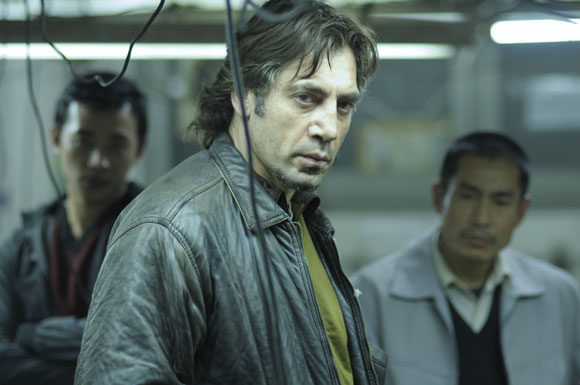Biutiful

Javier Bardem as Uxbal in BIUTIFUL, directed by Alejandro González Iñárritu. Photo Credit: Jose Haro

“It’s dangerous to trust a man who is hungry.” – Policeman to Uxbal
Alejandro González Iñárritu’s Biutiful tells the story of a man beset by death, despair and guilt, seeking redemption for his misdeeds. Uxbal (Javier Bardem) has scams running in Barcelona, Spain, like spinning plates he’s attempting to keep up. The slightest event could upset the balance, and does. Adding to matters, Uxbal hears the dead. This concept is introduced cleverly, as he attempts to assure a family that one of their sons has made passage smoothly into the afterlife.
In order to manage the various deals he has going on, Uxbal has stashed a sizable amount of cash, but his family subsists on ice cream and other junk food. He and his children, Ana (Hanaa Bouchaib) and Mateo (Guillermo Estrella), imagine they’re eating sausages, eggs, burgers and fries.
The story is bookended by the untimely death of his father, whom he sees as a young man in a snowy forest. This weighs heavily on Uxbal, and aside from the fact that the city plans to bulldoze the cemetery where he is interred (to build a mall, of all things), we come to understand the reason why. Complicating matters is his manic-depressive, alcoholic wife, Marambra (Maricel Álvarez), a massage therapist (read: prostitute). Mr. Iñárritu paints her in a fairly negative light, as a motormouthed harpy with a drug addiction—a threat to his children’s stability. But is Uxbal any better? The director doesn’t do a very good job of balancing this out, but any observant viewer can infer it.
Between the various subplots, including a counterfeit sweatshop operation run by Asian gangsters, the relocation of Uxbal’s fathers grave, African drug-running illegals, construction project bribes and Marambra’s antics, Mr. Iñárritu mires the story in an utterly depressive atmosphere. Like much of his other work, there are few, if any, moments of beauty or happiness with which to frame the hopelessness of Uxbal’s situation. It’s a two hour stretch between the uplifting visions of Uxbal’s father. If one were to rely purely on the director’s heavy-handed takes on Mexico and Spain, one would think not one person living there ever had a moment of fun.
That said, Rodrigo Prieto’s cinematography, contrasting soft blue-grey and green hues of life on the street with orange and red hues of home, serves the two environments of peril and security well. Even as Uxbal’s life spins apart, he attempts to maintain rules to provide stability for his children. Mr. Bardem, known to American audiences for ten years, since Before Night Falls, has been acting steadily for twenty. The character comes naturally to his ability to convey a man just doing his job, rather than a gangster heavy which Uxbal is not.
Mr. Iñárritu does a commendable job with the imagery and story vignettes, including a startling visual of recently deceased workers floating like apparitions trapped between this world and the next. However, he never completely and smoothly connects all the threads. The film could have been cut by forty minutes and conveyed the same message. I have to agree with AP film critic Christy Lemire, who’d like to see the filmmaker take a different direction from these brooding, heavy rehashes of Amores Perros… perhaps, a Bollywood musical set in Mexico City?
 Biutiful • Dolby® Digital surround sound in select theatres • Aspect Ratio: 1.85:1 • Running Time: 147 minutes • MPAA Rating: R for disturbing images, language, some sexual content, nudity and drug use. • Distributed by Roadside Attractions
Biutiful • Dolby® Digital surround sound in select theatres • Aspect Ratio: 1.85:1 • Running Time: 147 minutes • MPAA Rating: R for disturbing images, language, some sexual content, nudity and drug use. • Distributed by Roadside Attractions
Dolby and the double-D symbol are registered trademarks of Dolby Laboratories.